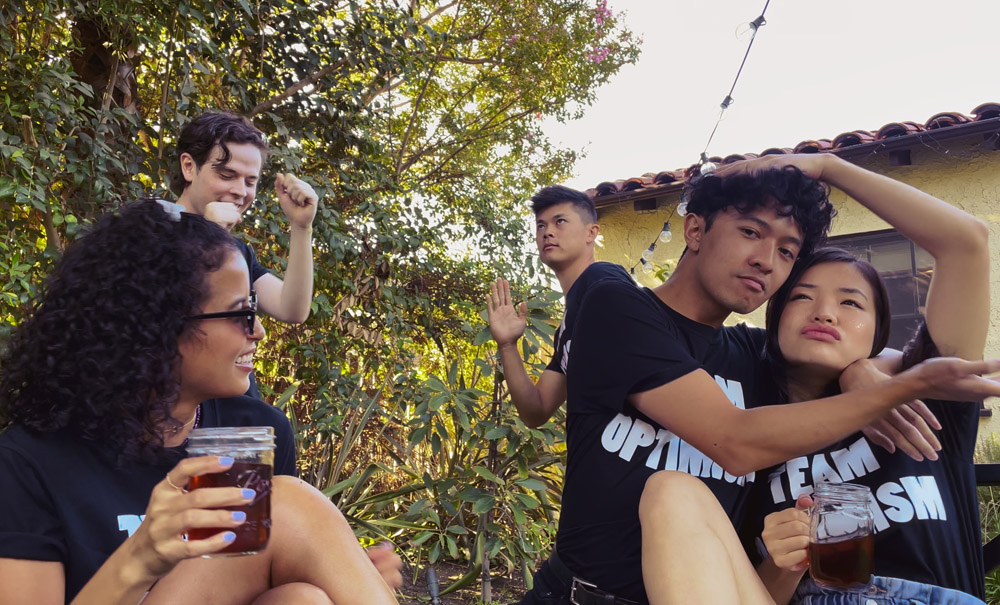There’s more good than bad that Dash (Matthew Mitchell Espinoza) captures in “Last Summer of Nathan Lee” when he tells his best friend (Harrison Xu) he’s going to get everything about their their final few months together on camera before he leaves for NYU Film School. Nathan got into a school back east too, but he isn’t expected to make the trip to Yale, learning on his 17th birthday that he doesn’t have much longer to live when diagnosed with an aggressive form of brain cancer and although he doesn’t show signs of poor health, he accepts pretty quickly that he won’t be around much longer, insisting that if Dash is going to carry around his camera that he’ll keep recording as his condition starts to take its toll.
The end is seen as only the beginning in Quentin Lee’s spry dramedy, which is presented in a handheld iPhone aesthetic that Dash, not yet having access to the cameras at Tisch, can afford, but unfolds with the elegance that a director only of Lee’s experience could achieve when the wild exploits that Nathan wants to pursue now that he’s been free of fearing a long-term future are very much in the wheelhouse of someone who broke out onto the scene with the vampire comedy “Shopping for Fangs” (co-directed with Justin Lin), but in having perspective from the years that followed gives “Last Summer of Nathan Lee” a great deal of weight when there are discoveries Nathan makes that he can only enjoy in the moment. While he and Dash take their relationship to another level, Nathan also finds a new kindred spirit in Lorelei (Natasha Tina Liu), a drama student he meets at a house party, and although the connection is inevitably short-lived, it’s a bond he awkwardly attempts to transfer to Dash when he knows it could bring a comfort to both his friends after he’s gone.
When the destination is more certain than the road they’re on, Nathan, Lorelei and Dash make decisions about their lives that are clearly shaped by the situation at hand, but Lee and writer Dennis Escobedo allow one to wonder what if these are the choices they’d make without the specter of death looming over them. When time is clearly precious, the film is not one to waste it, even with a generally laid-back approach that approximates a lazy summer day in both its gentle pace and its warmth. After premiering earlier this year at CAAMFest in San Francisco,“Last Summer of Nathan Lee” is making its way into theaters with its writer/director bootstrapping it around the country himself and recently, he joined Xu and Liu in graciously taking the time to talk about how the film came together, achieving a real sense of intimacy and quite literally needling each other.
Quentin Lee: During the pandemic in 2020, I was thinking quite a bit about death, and one of my friends from high school died of brain cancer, and somehow when I was in high school, I knew another friend in grade 11 who died of brain cancer before coming to grade 12, so I was like, “Oh shit.” It just stuck in my mind, and I was working with Dennis Escobedo, the writer, on another project, and I [said], “I want to do a found footage teen movie,” but I was like, “what if I use this idea, but from a more comedic slant. I was always in love with all the John Hughes and just all the teen comedies back in the ‘80s, except that they never have Asian American characters, and if they do, it would be Long Duk Dong, so I thought this would be a good way to shoot a few birds together. So I told Dennis, about this idea [where there’s] this kid with brain cancer, he’s dying, he has one year to live, but he wants to just have as much sex as possible — and he also would have a gay best friend because I think I want the gay best friend to be in love with him and make the documentary for him. Then I said, I worked with Harrison when he was 16 on a little short film called “Today Has Been Weird,” and I wanted to cast Harrison in it, so I said let’s write this for Harrison…
Harrison Xu: Yeah, I loved working with Quentin back in Vancouver on that short, so when he asked me, it was a no brainer. And personally, coming of age stories have always been some of my favorite movies, especially when they do such a good job blending comedy and drama, so when Quentin asked me, it was definitely a no brainer.
Quentin Lee: And then I just worked with Natasha and I thought she’d be great as the female lead, because she has a very great sensibility and she’s very sexy and I wanted to make a sexy film, so Dennis just went off writing, and we all met in June or July of 2020. And did Dennis meet you, Natasha?
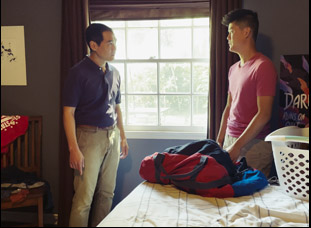
Harrison Xu: When I met Dennis at Quentin’s house, we started talking about the character a little bit, and it just seemed like the perfect role to play. It was really interesting for me because there’s so much nuance behind his role where he’s dying of brain cancer, but he wants to live life to the fullest. And where we started, he’s already been diagnosed – he’s already gone through all the grieving, the initial trauma of that. And now he’s just in this phase where he’s trying to make sure that he’s that rock for everyone else around him because it seems like throughout the movie, like everyone else is worried about him, but he’s trying to make sure no one else is worried about him, so there’s a lot of stuff going on underneath the surface that was a lot of fun to play with.
Quentin Lee: After we locked the cast, a studio read it [actually] owned by Fox and they make all these movies below a million dollars, and they said, “We love the script. We want to make it for $500,000.” But they said, “We don’t want you to make a found footage movie because they don’t sell.” And I said, “Okay, that’s fine. If you have $500,000, I probably go make a nice movie.” And then they said, “It can’t be brain cancer” and I said, “Well, he has to die of something” and we wrote this thing for Harrison and they said they couldn’t guarantee the cast. So that deal was dropped and we were back to square one, making this very independently.
At that point, we just thought we’ll put it into production, whatever we scrap together and then we did two two days of rehearsal. I met a teacher who teaches my son kung fu and she does this thing called chakra acting because it comes from the chakra, and I don’t know exactly what it is, but we did two days of rehearsal going through the entire script doing that [where it’s] intimate and also primal about sexual desires and hormones, [which is what] coming of age is about.
N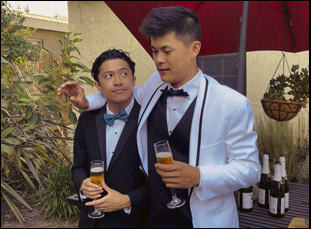
Did the found-footage nature of this change how you would perform in front of the camera? It seems like you might engage with it differently.
Harrison Xu: Because of the way that I was shot, found footage style through the point of view of Dash, it almost felt like as actors, we were allowed to just be as natural as possible. It felt very documentary-like, and Dennis, who wrote the script was on set as well and he was very generous and kind. Even though he had a script, he also allowed us a lot of room to improvise around his words, so because of that, I feel like as actors, we were able to make a lot of choices on the spot that whatever felt right in the moment.
Quentin Lee: Because [with a found footage movie] it’s so easy to shoot, we actually shot the whole thing on my phone [before the production] and we rehearsed the whole thing, so they would they would know there’s some options of what choices they wanted to make.
Harrison Xu: And in the way that Quentin shot it as well, we had a lot of long takes, so it almost felt like a play in a way, too, where we would roll it for like five minutes and we would do the scene and we’d really have the opportunity to really get into our characters and discover things.
Natasha Tina Liu: I really enjoyed the long takes. I think it really allowed everyone to just let go and let things happen in the moment. Spontaneity happened. It was all super fun.
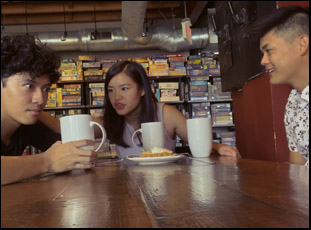
Harrison Xu: It’s funny. I grew up in the Bay Area and one of my uncles was one of the pioneers of acupuncture — he brought it to California, so as a kid, I actually had to go do acupuncture quite a bit and I was very used to needles, cupping, stones and all that in Chinese medicine. But I hadn’t done it in a long time, so when we did it in the acupuncturist’s office, it was like, “Oh, this feels very familiar.”
Was that the craziest day of filming for you?
Harrison Xu: Honestly, without spoiling anything, the last day where they send him off in his car and they go away to college. In that moment, it just felt very bittersweet as an actor and as a character because it was like “it’s the end of the movie and we’re almost done shooting, but because we had lived in these characters so long and we had shot it for 10 days, we were all basically like one tight-knit family by the end of it.
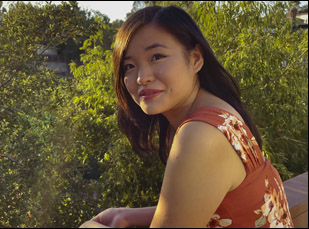
Quentin Lee: It’s most interesting because I think that this movie has gone to the least festivals and almost every festival that actually has taken my previous works have turned it down. Only CAAMFest and the Hong Kong Tiananmen Film Festival took the film and I remember my first feature, “Shopping for Fangs,” was very popular with festivals. It was at TIFF in 1997 and got into every other festival and most of my stuff gets into queer and Asian film fests. So there’s my eighth feature and it’s reversed, but at CAAMFest we [received] five or six reviews and they’re all positive, so that’s why I made the decision to self-distribute theatrically just to see how it goes.
It’s a unique opportunity, and it’s great to revisit self-distribution again — I also self-distributed “Shopping for Fangs,” and in between, other companies did the distribution for me, but back 25 years ago, I was just so crazed. Literally every day, it’s was a battle. We’re opening in L.A. and San Francisco and you had to ship all the prints on 35 millimeter and buy newspaper ads. Now, mostly everything is digital. I just send the DCP or just FedEx that. It’s a much more pleasurable process than before.
“Last Summer of Nathan Lee” opens on October 20th in Los Angeles at the Laemmle Royal.




